So you want to create Dystopian Stories, exploring the fascinating cyberpunk landscapes.

When writing stories about dystopias, whether they are futuristic or not, there are a few aspects of building the world that the writer should keep in mind. Some world building concepts work better for different types of dystopias, but there are a few general rules that should serve you well to start out.
The first concept can be applied to writing in general, but it is still very important to keep in mind when focusing on the topic of dystopias: know your scope. If you're writing a story that's less than 1000 words, you clearly don't have that much room to cover the concepts of the world you're building. For those types of stories, it's best to pick one or two aspects of your dystopia and flesh those out within your framework. Trying to cram too much into too small a space will cause problems for the pacing of your story, confusing the reader or making them lose interest in what they can understand. Pick an item of interest, form a structure around it, and keep the focus around that.
If you're writing a full novel, or there is no limit on your words or plot, this tenet applies somewhat less because you can control the scope more directly. You have more time and writing space to work with, so you can cover what you please and when you please. Still, getting wrapped up in minutiae can distract from the focus of your story.
The second concept is to be mindful of your tone when detailing events within the world. Contrary to what some might think, going as dark as possible and then some does not a good dystopia make. If nothing but awful things happen in your story, let alone your world, the reader will most likely tune out your story's events until they all blur together and interest is inevitably lost. While you don't necessarily need to jump directly to comedic relief, there needs to be a medium between suffering and joy that happens in your events. Even daily life events where not everything is terrible will go a long way in making sure the events don't blur together for your reader.
The third concept focuses on the building of your dystopia itself: make sure that the dystopian concepts you're using make sense in the context of your story. To a degree, it goes together with the previous two concepts. Knowing your scope will help you define the context of the story and the world, and being mindful of your tone will prevent you from introducing elements that are too jarring in your setting. How this concept applies to your worldbuilding varies depending on the core of your idea. If you're making a dystopia that's "descended" from the present, making sure your concepts have some tie to something occurring in the present will take you a long way. If you're focused on futuristic technology, define the limits of that technology and don't break them. Steampunk? Similar issue, except the aesthetics and expectations are a bit more rigidly defined at times depending on your audience.
These guidelines can be met with careful planning, especially for longer stories. They can all be distilled into one tenet: know what you're doing. Decide on your focus, your tone, and what you intend to explore in your dystopian world before you charge off into your own brave new world. Shorter pieces do not necessarily require less planning; if anything, they require more structure to ensure that they have a payoff. The stronger your foundation, the stronger your writing, and the better the payoff will be for the reader. Whether your goal is to shock, mesmerize, or simply entertain your reader, a strong support goes a long way.
The next two stories I have written to give you a feel on how to accomplish these fascinating cyberpunk landscapes.

(Steampunk Dystopia – Only “useful” inventions)
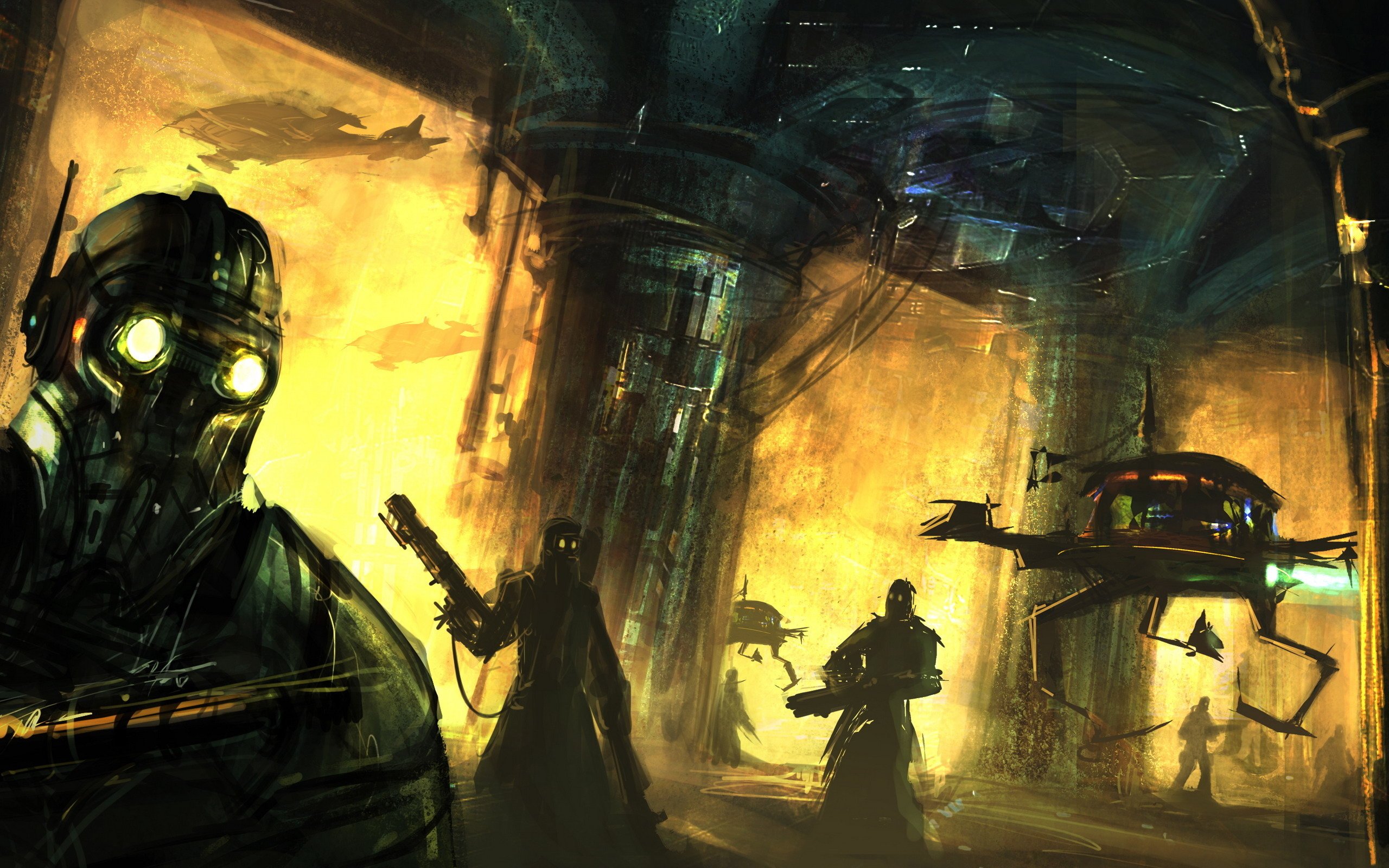
In a world of tinkerers and steam-powered gadgets, the government had moved to seize all control of what could be made by its country's population.
Only a select few were truly allowed to become inventors, and that was because they had to go through a very specific licensing process. Anyone caught creating items classified as inventions (due to either their novelty or their advanced use of current technology) that wasn't a licensed inventor was subject to heavy punishments. Jail time was often only the beginning for those unfortunate souls that got caught. Some of them, depending on the apparent usefulness of the invention, would simply disappear from life altogether, though signs pointed to these people still being alive somewhere.
However, those who managed to get an inventor license were not given free reign. A certain committee oversaw the approval of anything that could advance technology or was novel; in other words, no invention saw the light of day without the approval of this committee. The primary criteria for approval was "the usefulness of the invention for the people," or so they often claimed. However, whether or not something was deemed useful (for the people, always for the people) was arbitrary at best.
Anyone who paid close attention to the approval documents (assuming they had access) would notice that an awful lot of gadgets with potential military applications filled the filing cabinets of approved documents. It was rare that an invention was approved if its purpose was "miscellaneous" or "entertainment." Sure, a few quality-of-life-adjusting implements and humorous knickknacks would slip through every once in a while, but generally they were deemed "useless" and condemned to be scrapped.
Dirk Wellsley was a licensed inventor who had managed to get quite a few of his inventions approved. However, it seemed that he was, ironically, starting to run out of steam for coming up with novel ideas that could still be approved. His last few invention attempts were rejected with requests for revisions, which meant that while they weren't useless enough to merit punishment, they needed to be made "more useful." Those revisions had yet to be made before he sent in an application for a completely different invention.
Today, Dirk stood in front of the committee and set a small humanoid-looking contraption down in front of them. The chairman of the committee cleared his throat. "Mr. Wellsley, declare for us all the name and function of your new invention."
Dirk did as he was told, for the most part. "The name of this invention is Distinct Automaton. The function..." Here he diverged from the script that invention presenters were expected to follow. "Why don't I just show you?" He then proceeded to wind a dial on the back of the gizmo and push down a valve on its head. Soon, a rhythmic clicking and buzzing came from the automaton, punctuated by steam whistling out of its head like a boiling tea kettle. It began to march around the room to the rhythm of its noise, periodically stopping to emit long notes of steam.
Basically, the Distinct Automaton's purpose was to dance and create its own music. Eventually, after about two minutes, it let out the rest of its steam, gave a bowing gesture, and became dormant once more. When Dirk scanned the faces of the committee members, he was sure that several of them were trying to hide some form of amusement, whether it was at the automaton or at Dirk for creating such a peculiar work. Only the chairman remained stone faced.
"You didn't declare the function of this invention," he mumbled, exasperated sharpness creeping into his voice.
"The function is to produce music and motion," Dirk said, finally humoring the chairman.
The chairman didn't seem terribly humored, nonetheless. "Mr. Wellsley, you are aware that you're walking a very thin line with this committee, aren't you?"
"I'm sure you can think of a way it can be useful," Dirk answered, maintaining a friendly tone.
With a sigh the chairman shuffled some papers. "Please go outside. The committee has much to discuss."
For some reason, Dirk felt no anxiety about dancing around the committee's thin red line of usefulness. Everything he made was enough to potentially be useful with a few tweaks, yet not flagrantly useless enough to condemn him. Sure, he'd probably have to add some form of military use to his automaton, but that was nothing compared to the joy he got from messing with the committee's heads, even briefly.

(Futuristic Dystopia – Literary Expression banned
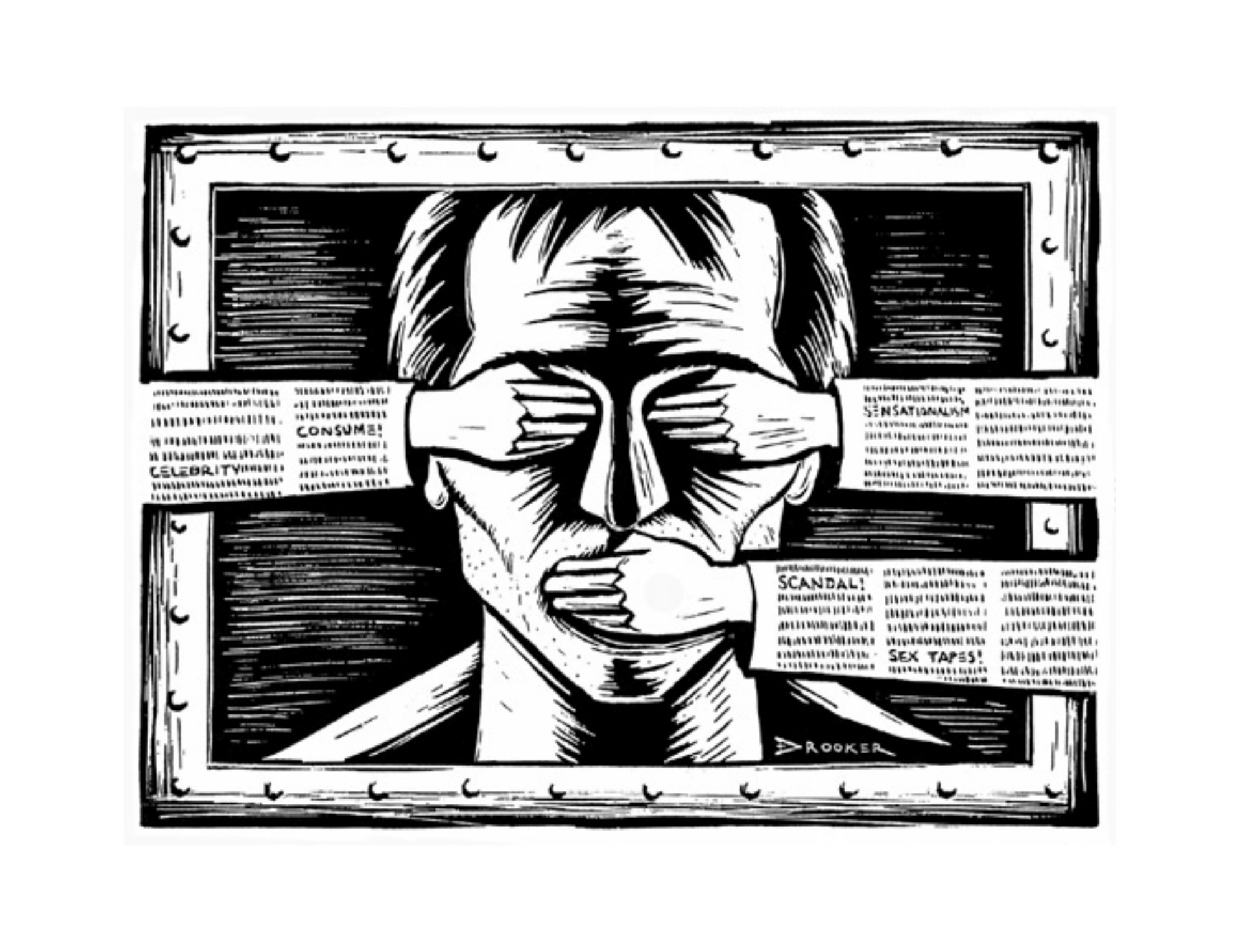
In a far-flung future, literary expression was banned.
Instituting the ban was something of a slow process as various governmental sectors argued over what exactly it was they were banning, but eventually, a somewhat specific definition was settled upon. Cutting all the legalese and fiddly terms out, the definition boiled down to the outlawing of any form of fiction. If it was not based in real events, real science, or real worlds, it was likely to be promptly destroyed. Its creator would be imprisoned at the very least, though executions for particularly "dangerous" expressions were not unheard of.
Books that were not burned were sealed away in vaults, and this act was treated as a triumph, "getting humanity closer to the truth." Most people had no choice but to accept the government's dogma, though some people saw it as limiting society's ability to create new thoughts. From here, specially selected intellectuals would determine what society knew as true. For that matter, they would also determine what society knew as false as well.
Still, certain sects of people studied the literary ban laws carefully and found loopholes in its wording. It had come before the time of the Mind's Eye projects that could record strong imagery directly from a person's brain (or rather, their mind). Images, sounds, or a person's "mental voice" recorded by a Mind's Eye machine were not classified as a type of literature, and so it was only a matter of time before an underground market evolved around "fictional recordings." Some people encoded their dreams using the machines (something not even the government had figured out how to stop), while others recorded mental narrations of stories.
In this way, it was like oral traditions had arisen again, but in a technologically advanced society. Some smart alecs caught onto this happening and began to name the centers of fictional exchange after locations where oral traditions had caught on. However, due to a miscommunication, they all eventually became known as agoras, due to the power of the oral tradition in ancient Greece. There would have been more references to Vedic traditions in India if not for that misunderstanding.
Still, people gathered in the agoras, swapped memory sticks with recordings on them, and discussed their literal or figurative dreams. They knew the government would try to crack down on them eventually, but until then, they were nearly untouchable. If the memory sticks were confiscated, then they would just have to rely on oral tradition in its truest form. After all, the government had yet to figure out how to permanently stop dreams or erase memories.
In this way, literary expression still lived on. Even though only relatively few could gain access to it, it was better than nothing as most saw it. It just took effort, and in that way, it seemed that only the best records made it through the agoras each day. Memes resurfaced in new and interesting ways, ways not seen since the earlier days of the internet. Not many people knew where these memes came from, but they spread around, and in that way, literary expression survived as well. How ironic that simple memetic jokes and catchphrases were deemed too inconsequential for the government to interfere with, and yet they carried the payload that wasn't supposed to exist.
Even with the apparent success of the "recording rebellion," members still had concerns of what would happen if the government made a move against them. Then again, only so much could be done. Dreams could not be stopped, and memories could not be erased. Until the government knew how to implement those measures, humanity would remain resourceful and protect the culture that had gotten it so far through its history.

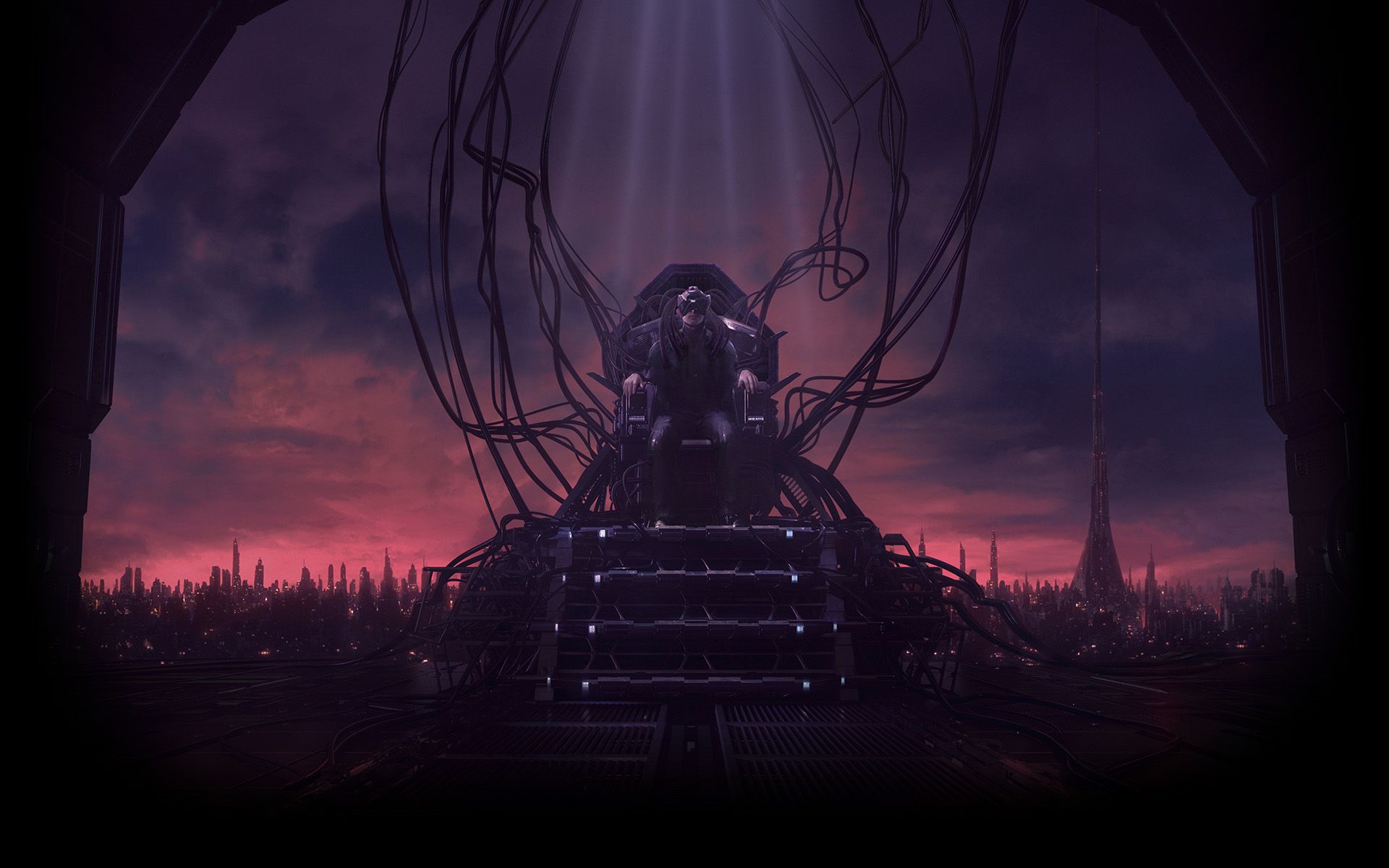
This post is due to many people wanting to Create the voice files for The Short Stories I create which revolves on Dystopian Futures, Humanity and many other ideas. This is the Discord group keep in mind it is still in RAW format.
Dystopian Futures - Discord Group

I am looking for voice talent see post below for more details.
I would like to make some AudioBooks out of them, I am looking for people who are very great at reading with personality and are able to give the listener a sense of being part of the book.

I am not looking for experienced Voice Over talent I am looking for Steemians that are English speakers, character actor and improv artist. A smooth, professional and polished vocal style. That are capable of delivering recorded material to me in mp3, m4a, wav, or aiff formats.
If you are able and willing to provide I will pay 5 SBD per AudioClip of the story done, please keep in mind the Stories are very unique and should require a unique voice. They are between 500-800 words, I currently have about a dozen short stores on steemit and will continue to write more, thus give more opportunities to people that want to earn and help out.
Some things I am looking for
- Voice must be dark, with emotion
- Must understand this is a dystopian setting
- Able to make the listener be part of the story
- Above 55 Rep just means you know how to get around here and you are somewhat active.
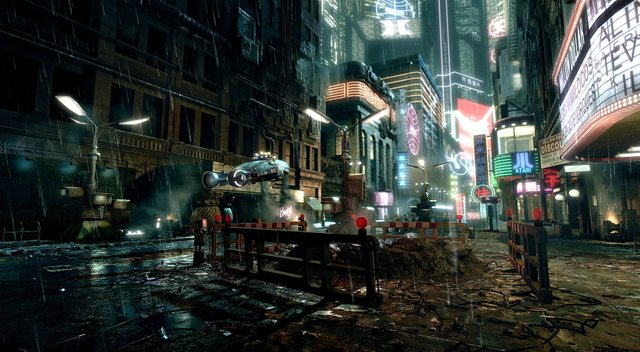
If you have not yet read some of my stories please have a look below.
Futuristic Dystopia – Literary Expression banned - A Chronocrypto Short Story
Steampunk Dystopia – Only “useful” inventions - A Chronocrypto Short Story
Dystopia new species of humans - A Chronocrypto Short Story - (Narrated by @Avesa)
2045- year of the apes, ft. Dr. Chrono - A ChronoCrypto Short Story
Dystopium: It’s not better, it just feels that way - A Chronocrypto Story - (Narrated by @voraces)
Reptilian Alien Precursors- Human POV Part 2 - A Chronocrypto Short Story
Reptile Alien Precursors – Alien POV - A Chronocrypto Short Story
Minds Can be Hijacked - A Chronocrypto Short Story - (Narrated by @voraces)
Robots and their rights - A Chronocrypto Short Story - (Narrated by @voraces)
Current Tech leads to Dystopia - A Chronocrypto Short Story - (Narrated by @voraces)
AI Drones - A Chronocrypto Short Story
A Chronocrypto Short Story - Corporate Conglomerate Dystopia - (Narrated by @voraces)
Singularity - A Chronocrypto Short Story - (Narrated by @voraces)
A Donald Marshall Inspired Story. (Narrated by @voraces)
A chronocrypto short Dystopian Story: The Creation Animid Unit S-01(Narrated by @voraces)
Technology and its upcoming dystopian effects.
Robot Equality - Is it here?
Beta JR World's AI Server(Fiction/Non-Fiction)(Narrated by @voraces)
Clone A-2 (Fiction/Non-Fiction)(Narrated by @voraces)
In order to be a good fit please read some of these stories to get a feel of how they should engulf the listener.
If you are interested in doing this small project with me and earn some SBD and of course your name as the narrator please contact me on Discord name chronocrypto. Hopefully we can get a wide variety of voices for the project.
[Title]Written by: @chronocrypto[Narrator]
The Audio files will be uploaded on soundcloud and posted on steemit by @chronocrypto, you will send me the audio clip through Discord, so that everyone can listen to the stories.
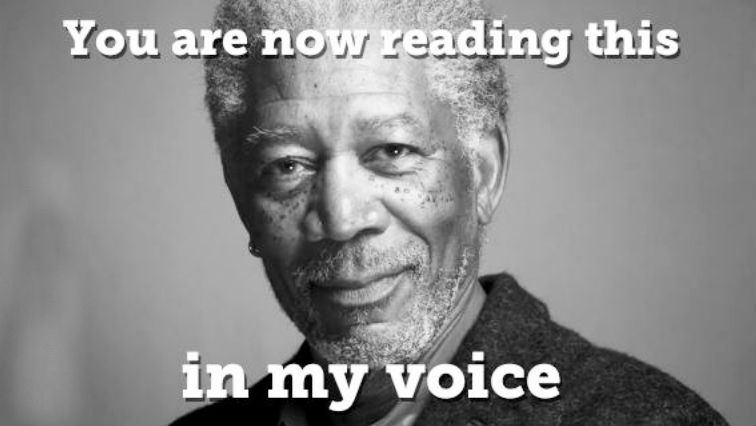

Finished AudioBooks

The hell..? I thought I was following you already. Problem rectified.
Well, I thought you were already following me, Well thanks for fixing the problem.
I would love to see a dystopian peice from you.
Some people have a special talent for writing! Youve got it!
I agree.Interesting and informative article

Why thank you for the kind words.
I love dystopian stories and movies. The best movies are The Hunger Games, Divergent, Maze Runner...etc. something about life after the apocalypse is so appealing!
Maze Runner is a nice one.
This is ameizing😃
Simple, solid pointers for any writers. I see a lot of decent work that would be a lot better if they stayed in scope instead of messily trying to keep our attention by adding every exciting element possible within a short piece. Also, the first story reminds me of how I view so many aspects of our society- every area of study was invented and fleshed out over hundreds of thousands of years of talented people participating. The idea of licensing has become so accepted, yet it stifles a lot of progress by excluding unique talent from joining in. Recently I saw a post on facebook asking for a licensed tarot card reader and I LOL'd at the silliness of it. Of all of the millions of people who study or use tarot, it seems some group took it upon themselves to declare themselves the legal entity to charge people for a license haha. Stopping people from inventing is a scary yet logical step it seems haha.
excellent
Wao es mucha información tendré que leerla
You are too good in writing. How is that easy for you. Can you tell me how you do that.
I describe it in this post.
Come look at my introduction. I'm building a cyberpunk story and I think you guys will like it
I will have a look at it.
thank you I resteemed your post its very interesting
Hi @chronocrypto! You have received 0.5 SBD @tipU upvote from @cardboard !
from @cardboard !
@tipU pays 100% profit + 50% curation rewards to all investors, allows to automatically reinvest selected part of your payout and can do other cool stuff :) Click here for more info.